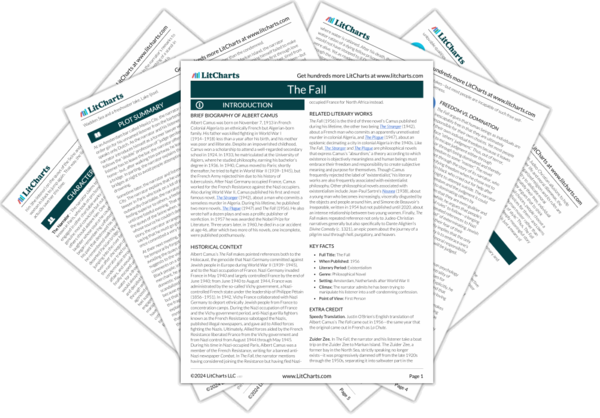The Fall implies that Judeo-Christian narratives are a useful framework for understanding the human condition. At the same time, the. novel also argues that people use organized religion and its dogmatic rules to shirk individual responsibility for their own free choices. First, the novel implies the usefulness of Judeo-Christian narratives by alluding to these narratives in its title and its text. The “fall” of the title refers to three things. First, it refers to the suicide of the young woman in black who jumps into the Seine and drowns. It also refers to the narrator’s fall from innocence and self-esteem into tortured self-loathing after he is the sole witness to the woman’s suicide and fails to help her. Finally, the title indirectly references the Fall of Man, the Judeo-Christian story of humankind’s transition from innocent goodness to sinfulness and experiential knowledge of evil, a story that the narrator’s fall from innocence into guilt echoes in a modern and realistic setting. The narrator reinforces the Judeo-Christian allusion in the novel’s title and its central incident (the woman’s suicide and the narrator’s inaction) by drawing parallels between his own experiences and other elements of Judeo-Christianity, such as the Garden of Eden (the paradise in which humanity lived before the Fall), hell and limbo (parts of the afterlife according to some Christian denominations), and Christian baptism.
Yet even as the novel uses Judeo-Christian allusions to help elucidate its narrator’s inner life and moral dilemmas, the narrator also argues that organized religion and its rules are just another way that people try to abdicate moral responsibility for what are ultimately their free, individual choices. For example, the narrator argues that to shirk responsibility for making individual choices, people choose a “master” to follow who makes the choices for them—and claims that the only reason they choose a human master rather than God and the church is that God is “out of style.” Thus, The Fall characterizes Judeo-Christianity as a deeply meaningful story while suggesting that organized religion is just a means of dodging individual moral responsibility.
Judeo-Christianity ThemeTracker

Judeo-Christianity Quotes in The Fall
Have you noticed that Amsterdam’s concentric canals resemble the circles of hell?

Unlock explanations and citation info for this and every other The Fall quote.
Plus so much more...
Get LitCharts A+A very Christian friend of mine admitted that one’s initial feeling on seeing a beggar approach one’s house is unpleasant. Well, with me it was worse: I used to exult.
I realized likewise that it would continue to await me on seas and rivers, everywhere, in short, where lies the bitter water of my baptism.
They have hoisted him onto a judge’s bench, in the secret of their hearts, and they smite, they judge above all, they judge in his name. He spoke softly to the adulteress: “Neither do I condemn thee!” but that doesn’t matter; they condemn without absolving anyone.
Justice being definitively separated from innocence—the latter on the cross and the former in the cupboard—I have the way clear to work according to my convictions.
Brr . . . ! The water’s so cold! But let’s not worry! It’s too late now. It will always be too late. Fortunately!











